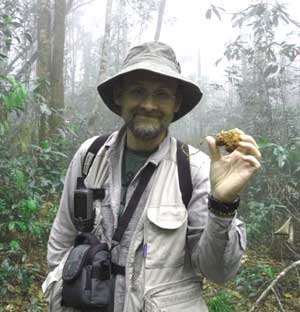Nature's Doctor - Mammals and Insects Self Medicate
The Scientist http://www.the-scientist.com/?articles.view/articleNo/32966/title/Natural-Born-Doctors/ reported that animals and insects self-medicate when they have the need.
Excerpts:
CHIMPS " More than 30 years ago, Michael Huffman, who studies evolution of social systems at the University of Kyoto, noticed that wild chimps were treating themselves by ingesting foods with special properties that fight intestinal worm infections."
. . .
"Huffman first encountered self-medicating chimps in Africa in the 1980s. He recalls watching a sick chimpanzee suck juice from the bitter leaf plant. A traditional healer, Mohamedi Seifu Kalunde, told Huffman that bitter leaf was used medicinally by the local people, the WaTongwe. The plant didn’t provide nutrients to the chimpanzee, and is rarely used by healthy chimps, but sick animals are commonly observed ingesting the plant, and their symptoms usually resolve soon after. Huffman’s later work identified several compounds in bitter leaf and other medicinal plants used by the chimps with activity against parasitic nematode infections."
More about Huffman's work
http://www.pri.kyoto-u.ac.jp/sections/social_systems_evolution/huffman/index.html
SHEEP "Sheep, for example, are known to regulate their energy and nutritional balances by modifying their food choices. Additionally, they learn to choose food rich in tannins—astringent plant compounds that can kill parasites and relieve infections—when suffering from gut nematode infections."
INSECTS
Monarch butterflies "Scientists recently discovered, for example, why monarch butterflies are so picky when it comes to choosing the milkweed plants on which to lay their eggs. “The females often taste a plant, reject it, and fly away,” explained Jacobus de Roode of Emory University. It turns out that this choosiness is regulated by the monarch’s health. De Roode found that butterflies infected with the protozoan parasite Ophryocystis elektroscirrha seek out milkweeds containing high levels of cardenolide, a plant steroid that interferes with parasite growth in monarch caterpillars."
Fruit flies also self-medicate, but instead of consuming plants, they turn to alcohol.
Click on the link above to read the entire article in The Scientist.
In 2010 Carol Clark reported in the Emory University newsletter, EScience Commons, that Emory U received a $500,000 grant to conduct the research.
“We believe that our experiments provide the best evidence to date that animals use medication,” says evolutionary biologist Jaap de Roode, who led the research.
If you are a butterfly enthusiast, don't miss this 5 minute video from 2010
http://esciencecommons.blogspot.com/2010/10/monarch-butterflys-medicine-kit.html
and here's The Butterfly Pharmacist from 2011
http://www.popsci.com/science/article/2011-09/brilliant-10-butterfly-pharmacist
Clark wrote about Monarch migration in May 2012
http://esciencecommons.blogspot.com/2012/05/mystery-of-monarch-migration-takes-new.html
"Biologists have long been fascinated by the innate and learned behaviors underlying animal migrations. When monarchs are breeding, for instance, they can live up to four weeks, but when they are migrating, they can live as long as six months.
“As the day length gets shorter, their sexual organs do not fully mature and they don’t put energy into reproduction. That enables them to fly long distances to warmer zones, and survive the winter,” de Roode says. “It’s one of the basic lessons in biology: Reproduction is very costly, and if you don’t use it, you can live much longer.”"
Excerpts:
 |
| Michael Huffman |
. . .
"Huffman first encountered self-medicating chimps in Africa in the 1980s. He recalls watching a sick chimpanzee suck juice from the bitter leaf plant. A traditional healer, Mohamedi Seifu Kalunde, told Huffman that bitter leaf was used medicinally by the local people, the WaTongwe. The plant didn’t provide nutrients to the chimpanzee, and is rarely used by healthy chimps, but sick animals are commonly observed ingesting the plant, and their symptoms usually resolve soon after. Huffman’s later work identified several compounds in bitter leaf and other medicinal plants used by the chimps with activity against parasitic nematode infections."
More about Huffman's work
http://www.pri.kyoto-u.ac.jp/sections/social_systems_evolution/huffman/index.html
SHEEP "Sheep, for example, are known to regulate their energy and nutritional balances by modifying their food choices. Additionally, they learn to choose food rich in tannins—astringent plant compounds that can kill parasites and relieve infections—when suffering from gut nematode infections."
INSECTS
 |
| infecte |
Fruit flies also self-medicate, but instead of consuming plants, they turn to alcohol.
Click on the link above to read the entire article in The Scientist.
In 2010 Carol Clark reported in the Emory University newsletter, EScience Commons, that Emory U received a $500,000 grant to conduct the research.
“We believe that our experiments provide the best evidence to date that animals use medication,” says evolutionary biologist Jaap de Roode, who led the research.
If you are a butterfly enthusiast, don't miss this 5 minute video from 2010
http://esciencecommons.blogspot.com/2010/10/monarch-butterflys-medicine-kit.html
and here's The Butterfly Pharmacist from 2011
http://www.popsci.com/science/article/2011-09/brilliant-10-butterfly-pharmacist
Clark wrote about Monarch migration in May 2012
http://esciencecommons.blogspot.com/2012/05/mystery-of-monarch-migration-takes-new.html
"Biologists have long been fascinated by the innate and learned behaviors underlying animal migrations. When monarchs are breeding, for instance, they can live up to four weeks, but when they are migrating, they can live as long as six months.
“As the day length gets shorter, their sexual organs do not fully mature and they don’t put energy into reproduction. That enables them to fly long distances to warmer zones, and survive the winter,” de Roode says. “It’s one of the basic lessons in biology: Reproduction is very costly, and if you don’t use it, you can live much longer.”"


Comments